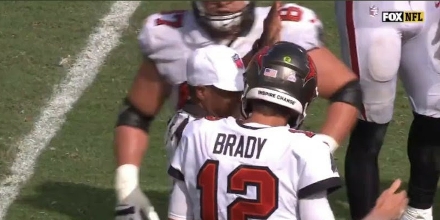NFL teams rely heavily on their quarterbacks to run the offense, lead the team, and win games. Quarterbacks normally win the MVP awards, appear in more commercials, and are taken early in the draft.
Teams build around the QB because they’ve demonstrated over and over again just how valuable and critical they are to a franchise’s sustained success. Along with their importance, has come an effort from the league to protect them, so they remain on the field.
They are the superstars of the league and it’s been decided that it’s not good when quarterbacks get injured. As a result, offensive lines do whatever they can to keep their QB upright while rules are in place for refs to call penalties against the defense when they’re too rough and put the QB in danger.
The “roughing the passer” penalty was in the spotlight this past weekend when called against Atlanta Falcons defensive tackle, Grady Jarrett, for unnecessarily throwing (according to the ref) Tom Brady to the ground during a sack.
Then on Monday night, Kansas City Chiefs defensive lineman, Chris Jones, was also penalized 15 yards for landing on Las Vegas Raiders quarterback, Derek Carr, with his full body weight, according to the ref.
Both of these calls have led to criticism and concern from fans and media that too much of the physicality is being taken out of football, while star quarterbacks seem to be receiving special treatment and advantages over defenders. Plus, people are frustrated that “Tom Brady gets all of the calls.”
On one end, it makes sense because of how valuable and important quarterbacks have become (especially Brady), but at the same time, does that mean refs should be giving them special privileges, more attention, and more protection?
Should QBs be elevated above other players, be allowed to get away with things on the field, and be shown favoritism? From an NFL standpoint or a business standpoint, there’s a case to be made for this approach, but is it the right thing to do, and what’s best for the entire league moving forward?
We see evidence of favoritism in sports based on position or status, especially for superstars, and unfortunately, this kind of treatment doesn’t stop on the field.
The reality is, in life, we can see how society favors the wealthy, powerful, and successful and it’s evident that certain people get special treatment, advantages, and more attention, and often get away with doing bad things.
Oftentimes in sports and life, we accept this and even participate in it. But, according to God’s Word, He doesn’t want us to show favoritism or partiality.
James 2:1-9 (NLT) explains, ”My dear brothers and sisters, how can you claim to have faith in our glorious Lord Jesus Christ if you favor some people over others? For example, suppose someone comes into your meeting dressed in fancy clothes and expensive jewelry, and another comes in who is poor and dressed in dirty clothes.
“If you give special attention and a good seat to the rich person, but you say to the poor one, ‘You can stand over there, or else sit on the floor’—well, doesn’t this discrimination show that your judgments are guided by evil motives?
“Listen to me, dear brothers and sisters. Hasn’t God chosen the poor in this world to be rich in faith? Aren’t they the ones who will inherit the Kingdom He promised to those who love Him? But you dishonor the poor! Isn’t it the rich who oppress you and drag you into court?
“Aren’t they the ones who slander Jesus Christ, whose noble name you bear? Yes indeed, it is good when you obey the royal law as found in the Scriptures: ‘Love your neighbor as yourself.’ But if you favor some people over others, you are committing a sin. You are guilty of breaking the law.”
The Amplified Bible translation of verse 1 says, “My fellow believers, do not practice your faith in our glorious Lord Jesus Christ with an attitude of partiality [toward people—show no favoritism, no prejudice, no snobbery].”
These verses are convicting when we think how easily we fall into favoring particular people, treating them differently based on superficial reasons, and giving them “all the calls on the field” to make sure they’re elevated above others.
Today, each of us can ask God to reveal how the sin of partiality plays out in our own lives, forgive us for it, and help us love everyone regardless of position, status, wealth, power, and accomplishments.
After all, God is our example as it says in Romans 2:11 (AMP): “For God shows no partiality [no arbitrary favoritism; with Him, one person is not more important than another].”
Thankfully, God’s love and grace are available to everyone, as we wrote about in Monday’s devotional. I’m Bryce Johnson and you can UNPACK that!
PRAYER: Heavenly Father, please forgive me for not loving certain people and showing more favoritism toward others based on superficial reasons. I pray I’d treat everyone with love, compassion, and kindness as I demonstrate the love and grace You’ve shown me. In Jesus’ name, I pray, Amen.
2. As followers of Jesus, why is it so important we don’t show favoritism?






